Wednesday Gazette
Congress-goers kicked back and relaxed at the Welcome Party!
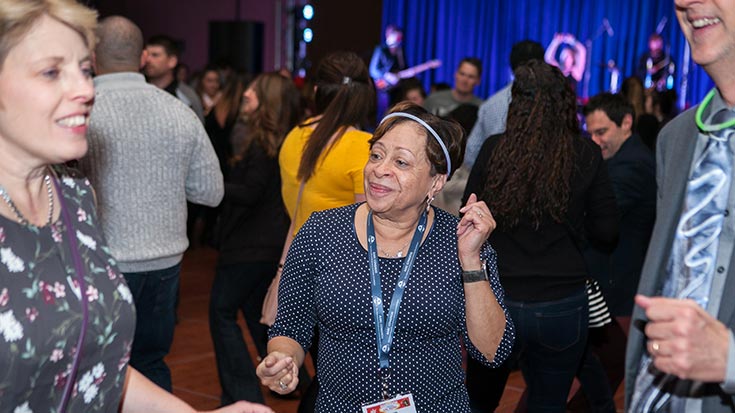
Welcome Party attendees.
After the first full day of the Congress everyone was ready for a little R&R yesterday evening, and they found it at the Welcome Party. Crowd Theory rocked the house and attendees got the chance to meet up with friends and colleagues, all while enjoying some great complimentary beverages and snacks. It was the perfect way to end day 1 of AARC Congress 2018.
President’s report
By Brian Walsh PhD RRT RRT-NPS FAARC
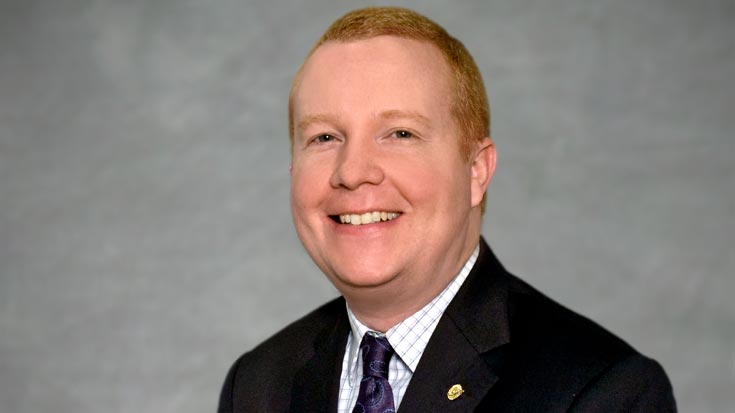
Brian Walsh.
It’s been two years since my installation as your president. Wow, how the time has flown. I have been busier than I ever thought imaginable working with the AARC Executive Office, Board of Directors (BOD), and House of Delegates, promoting, advocating, and advancing the profession on your behalf. While not always fun, it’s been a pleasure serving alongside such wonderful champions for the profession and visiting with many of you on your home turf.
When I took over from President Frank Salvatore, you could feel the momentum gained during his tenure. With excitement at the opportunities ahead and terror of the unknown, I felt like we, as a profession, had come to a fork in the road. We could either turn left and change radically and rapidly to continue to progress as a wonderful and needed profession serving millions of patients with cardiopulmonary disease for many generations to come; or we could turn right and return to our comfort zone of “business as usual” and regress rather than progress.
Bound and determine to meet your expectations and my own, I chose to focus on three areas our practice must positively influence or face irrelevance: quality, safety, and value. I truly believe we are on the cusp of having a greater influence on health care. The following is a review of the past year and highlights from each domain.
Quality
- In an effort to improve the quality of the care we provide we must continually expand the knowledge base of our profession. I don’t know about you, but many of the patients I serve have become increasingly complex over the years. In July of 2018, the BOD directed the Position Statement and Issues Paper Committee to update our position statement on Respiratory Therapist Education and Issues Paper on the RRT Credential to create a more affirmative stance and place an associated timeline. Since issuing the original position statements in 2016 the AARC has been working to make this a reality through multiple venues. Our interim human resource survey demonstrated that we are only growing the number of BS prepared RTs by 1.3% every three years. We are currently at 52%; however it will be 2065 before we achieve the 80% goal. This is just too slow.
- After we created these bold statements and goals, we needed to get busy to make this vision a reality. So, we created an Ad Hoc Committee on Baccalaureate Entry to Practice. This committee has been charged to remove barriers to increasing baccalaureate-prepared respiratory therapists from entering the workforce.
- CoARC has assisted us in this endeavor by changing one of their standards (1.01), which went into effect this year, limiting new RT programs to baccalaureate or graduate degree granting programs. The AARC wholeheartedly supported this change.
- This year saw the second offering of our exciting Apex Recognition Program that recognizes respiratory care departments in acute care hospitals, long-term care facilities, and home medical equipment companies. This program not only recognizes significant contributions of the respiratory therapist and highlights best practices, but it also helps us recognize respiratory therapy departments that are furthering our mission and vision to make a difference in the lives of the patients we serve.
Safety
- Respiratory therapists provide the safest respiratory care. However, medical errors are the 3rd leading cause of death in the U.S. As responsible citizens of the health care community, we must take notice and evaluate our practice for opportunities to continue to provide the safest care around, and we have many opportunities to do just that.
- We are leading and advancing mechanical ventilation safety by partnering with others like the Association for the Advancement of Medical Instrumentation. We have chronicled our ventures down this path in AARC Times.
- We have partnered with the Patient Safety Movement to create Zero preventable deaths. Areas of focus have been on Ventilator Associated Pneumonia, Oxygen Monitoring During Inpatient Transport, and Airway Safety.
- We are improving access to respiratory therapists by lobbying for telehealth legislation. This would not only grant access to our services through alternative means such as telehealth but would allow us to ensure safe patient care through education and assessment. Many of you helped us during our virtual lobby weeks and I thank you. We couldn’t do it without you. We hope a bill will be dropped at any moment.
Value
- By promoting safety and high-quality respiratory care services, we demonstrate our value from the beginning, but we need to do more. We must demonstrate the efficiency and effectiveness of respiratory care when provided by the respiratory therapist. In an effort to support research, the BOD developed the Vision Grant. The primary purpose of the AARC Vision Grant is to provide funding to members conducting research initiatives that document the clinical and economic impact of the respiratory therapist specifically related to the AARC mission to secure the highest quality care for all patients who suffer from cardiopulmonary disease.
- We continue to promote respiratory therapists nationally and internationally.
- During this year’s PACT meeting in Washington DC, I’m proud to report that I did not have to describe what a respiratory therapist is a single time. This took years of hard work and lobbying by all of you.
- The film COPD: Highly Illogical – A Tribute to Leonard Nimoy was released this past year. The AARC was a consultant to the filmmakers, and the film highlights the services provided by respiratory therapists in the management of COPD.
- Internationally we are making strides as well. Our profession is growing tremendously. This past year two respiratory therapy programs were started in Africa, to mention a few. We are seeing growth in China as well. I was able to attend and share experiences at conferences hosted by the Mexico Society for Respiratory Therapy and CONGRESO SOLACUR Mexico City, and I also attended the XIX International Symposium of Cardiopulmonary Physiotherapy and Intensive Care Physiotherapy in Manaus, Brazil.
It’s been a really fun and busy year and those are just some highlights of our many successes. I certainly couldn’t have done this without your help and the help and leadership of Past President Salvatore and Tom Kallstrom and the entire staff of the Executive Office, who serve you tirelessly. Additionally, I am excited to hand off this presidency to Karen Schell, who will maintain and expand the mission and vision we have created this year. I look forward to supporting her efforts to gain even more momentum as she starts her first year. Please contact me at brian.walsh@aarc.org with any suggestions you might have about our trajectory. I’m always willing to listen.
Secretary-treasurer’s report
Lynda T Goodfellow EdD RRT AE-C FAARC
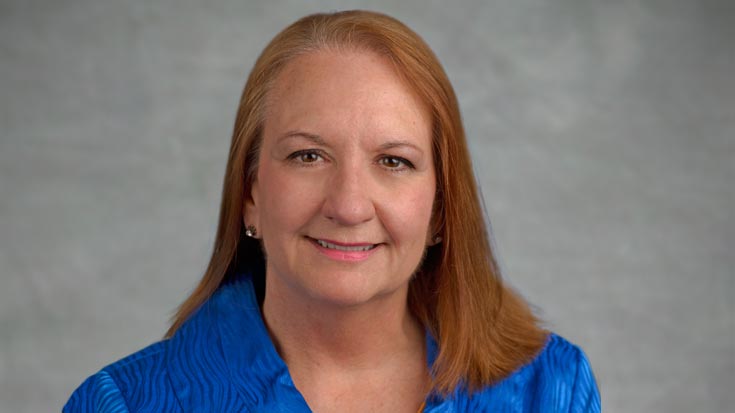
Lynda Goodfellow.
As of the second quarter of 2018, the AARC is in good fiscal standing. The Executive Office and the Board of Directors continue to provide fiscally responsible leadership and oversight for the members of the organization. This includes quality educational program planning, advocacy for patients with lung disease, and persistently emphasizing the value of respiratory therapists at all levels of government.
Membership: While total membership is more than 45,000, an expected decrease in the Total and New member numbers is attributed to fewer new and student members due to the deactivation of the free web student membership program. For comparison:
- July 2017 Total Students 5432 increased to August 2017 Total Students 6094
- July 2018 Total Students 4531 decreased to August 2018 Total Students 4527
Revenues: Overall revenues and expenses are slightly above the budgeted plan but the net margin is positive. Publication advertising, educational products, and convention revenue are doing well. The financial markets are not as positive overall as last year but interest and dividend income are higher, which is offsetting the rate and amount of losses.
Grants: This includes grants from our corporate partners, rents, and royalties. Net income exceeds budget.
President Schell outlines her vision for 2019–2020
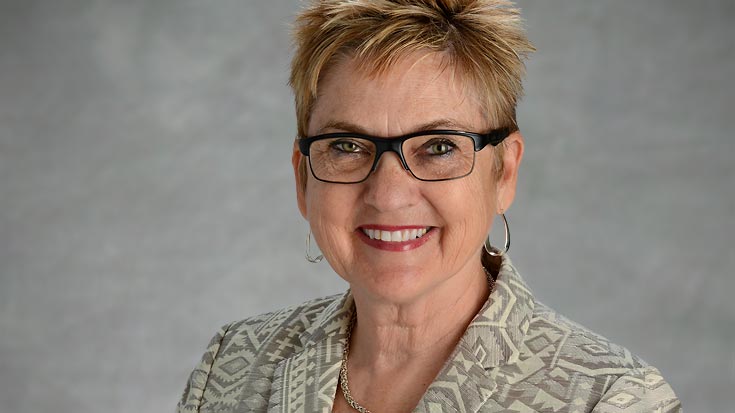
AARC President Karen Schell.
Outgoing AARC President Brian Walsh PhD RRT RRT-NPS FAARC handed the gavel over to incoming President Karen Schell DHSc RRT RRT-NPS RRT-SDS RPFT RPSGT AE-C CTTS at the annual business meeting this morning, and Dr. Schell took the podium to share her vision for her term in office.
“The Board of Directors of the AARC has introduced six horizon goals to address the future of the profession,” said Dr. Schell. “As president, it is my goal to implement these goals along with the Board of Directors into a workable plan that can meet timelines and produce achievable outcomes.”
She quoted inspirational author Catherine Ponder on the thinking behind the goals: “We have become self-evolvers. We are responsible for our own evolution. Evolution means selecting and therefore choosing and deciding.”
Dr. Schell believes the new horizon goals fit into that mindset. “Our time has come to move our profession ahead. It is time to decide to evolve,” she told her audience. “Your willingness to participate is needed. We need to nurture and grow our future and it takes everyone to be engaged in growing the profession and mentoring RTs to meet the challenges ahead.”
Here are the six horizon goals she will work toward during her term in office —
- We need to advocate for our patients with respiratory therapists who are recognized and supported in all health care settings.
- We need to communicate our message to all stakeholders providing research based outcomes and market the value of respiratory therapists.
- We need to grow our educational opportunities and become a valuable resource to the practice of respiratory therapy.
- We need to be recognized as the number one provider of respiratory therapy educational opportunities to all inter-professionals.
- We need to grow our membership and encourage all populations to be involved in promoting the profession for the best patient outcomes.
- We need continue to explore opportunities for the AARC to seek revenues to fund our mission and education, and meet the needs of our patients and membership.
“I invite you to reach out to our colleagues, get them involved, seek opportunities to grow, mentor our future, and press forward,” concluded Dr. Schell. “Just know that you have a choice today and your future lies within your power. Let yourself feel the power, let yourself know the power that is yours. We can use your help. Contact me and I will find a place for you to be part of the movement.”
Donald F Egan Scientific Memorial Lecture — The ABCDEF Bundle and the Role of the Respiratory Therapist
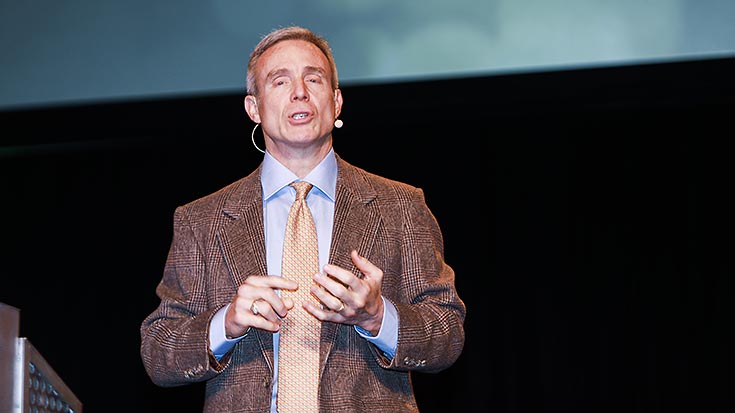
Wes Ely delivers the Egan Lecture.
ICUs all across the country are implementing the ABCDEF Bundle to improve patient care, ensure more patients move more swiftly through the process of discontinuing mechanical ventilation, and mobilize our sickest patients towards successful hospital discharge. Wes Ely MD MPH will talk about the RT’s role in this process during tomorrow morning’s Egan Lecture.
“About 400 peer-reviewed articles over the past 20 years have gone into the creation of the ABCDEF ICU Liberation Bundle,” says Dr. Ely. “What we have learned in over 20,000 patients at ICUs from across the United States is that this is a remarkable way of organizing the entire ICU team that prioritizes the full person — mind, body, and spirit — and reduces time on the ventilator, in the ICU, and in the hospital, saves lives, and dramatically improves the amount of time free of delirium and coma.”
The “ABCDEF” in the ABCDEF Bundle stands for — A: assess, manage, and prevent pain; B: both spontaneous breathing trials and spontaneous awakening trials; C: choice of analgesia and sedation; D: delirium prevention and treatment; E: early mobility/exercise; and F: family engagement.
Dr. Ely is a professor of medicine at Vanderbilt University School of Medicine, where he holds the Grant W Liddle chair. He has subspecialty training in pulmonary and critical care medicine, and his research has focused on improving the care and outcomes of critically ill patients with ICU-acquired brain disease. Dr. Ely has more than 250 peer-reviewed publications and over 50 published book chapters and editorials to his credit.